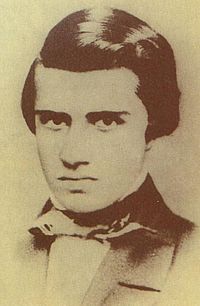Álvares de Azevedo facts for kids
Quick facts for kids
Álvares de Azevedo
|
|
|---|---|

A picture of Azevedo taken during the late 1840s
|
|
| Born | Manuel Antônio Álvares de Azevedo September 12, 1831 São Paulo, São Paulo, Empire of Brazil |
| Died | April 25, 1852 (aged 20) Rio de Janeiro, Rio de Janeiro, Brazil |
| Resting place | Saint John the Baptist Cemetery, Rio de Janeiro, Brazil |
| Pen name | Job Stern |
| Occupation | Poet, playwright, short story writer, essayist, Law student |
| Language | Portuguese |
| Nationality | Brazilian |
| Alma mater | University of São Paulo |
| Period | 19th century |
| Genre | Theatre, poetry, essay |
| Literary movement | Romanticism, Ultra-Romanticism |
| Notable works | Noite na Taverna Macário Lira dos Vinte Anos |
| Relatives | Inácio Manuel Álvares de Azevedo (father) Maria Luísa Mota Azevedo (mother) |
Manuel Antônio Álvares de Azevedo (born September 12, 1831 – died April 25, 1852) was a Brazilian writer. His friends and family called him "Maneco". He was a Romantic poet, short story writer, and playwright.
He is known as one of the most important writers of Ultra-Romanticism and Gothic literature in Brazil. His stories and poems often explored ideas like love and death, or dreams and reality. He was greatly influenced by famous European writers such as Lord Byron and Johann Wolfgang von Goethe.
Sadly, Álvares de Azevedo died very young, at only 20 years old. Because of this, all his works were published after his death. Over time, his writings became very popular, especially among young people.
Today, he is honored as a patron of two important literary groups in Brazil: the Brazilian Academy of Letters and the Paulista Academy of Letters.
Contents
Biography
Early Life and Family
Álvares de Azevedo was born in São Paulo on September 12, 1831. His father, Inácio Manuel Álvares de Azevedo, was a law student. His mother was Maria Luísa Azevedo.
There's a popular story that he was born in a library, but he was actually born at his grandfather's house. Álvares had a younger brother who sadly died in 1835. This early loss was a difficult experience for young Álvares.
Education and Influences
In 1833, Álvares and his family moved to Rio de Janeiro. He started school at Colégio Stoll in 1840. Later, in 1845, he joined Colégio Pedro II.
At school, he learned English, French, and German. He loved to read and discovered many famous authors. These included Lord Byron, Victor Hugo, William Shakespeare, and Johann Wolfgang von Goethe. Their works greatly shaped his own writing style.
University and Literary Clubs
After finishing Colégio Pedro II in 1846, Álvares de Azevedo began studying at the University of São Paulo Law School in 1847. There, he became friends with other poets like José Bonifácio the Younger.
Together, they started a famous club called the "Sociedade Epicureia" (Epicurean Society). This club was based on ideas of enjoying life and art. They also planned a poetry book called As Três Liras (The Three Lyres). However, this book was never fully finished. Only one part, Lira dos Vinte Anos, was published after Álvares's death.
Final Years and Death
Álvares de Azevedo had delicate health. He got tuberculosis, a serious lung disease. To feel better, he left college and moved to his grandfather's farm in Rio, where the weather was warmer.
While there, he had a terrible accident: he fell from a horse and broke his hip bone. He had surgery, but it was not successful. Álvares de Azevedo died on April 25, 1852, at just 20 years old. It's a common misunderstanding that he died from tuberculosis; the horse accident and surgery were the direct cause.
He was buried the next day. His last words were said to be, "What a fatality, my father!" Coincidentally, one of his last poems was called "Se Eu Morresse Amanhã" ("If I Died Tomorrow"). This poem was read at his funeral.
Álvares de Azevedo's cousin, Maria Catarina de Abreu Sodré, later married the famous writer Joaquim Manuel de Macedo. It is believed that Macedo based a character in his novel A Moreninha on her.
Works
Álvares de Azevedo's main works include:
- Lira dos Vinte Anos (1853; a collection of poems)
- Macário (1855; a play for the theater)
- Noite na Taverna (1855; a book of short stories, published under the name Job Stern)
- O Conde Lopo (1886; an epic poem that only exists in parts today)
- O Poema do Frade (1890; a narrative poem)
He also wrote many letters and essays. He translated several poems into Portuguese, including parts of Lord Byron's Parisina and William Shakespeare's Othello. He also started a novel called O Livro de Fra. Gondicário, but only parts of it remain.
See also
 In Spanish: Álvares de Azevedo para niños
In Spanish: Álvares de Azevedo para niños
 | Delilah Pierce |
 | Gordon Parks |
 | Augusta Savage |
 | Charles Ethan Porter |

